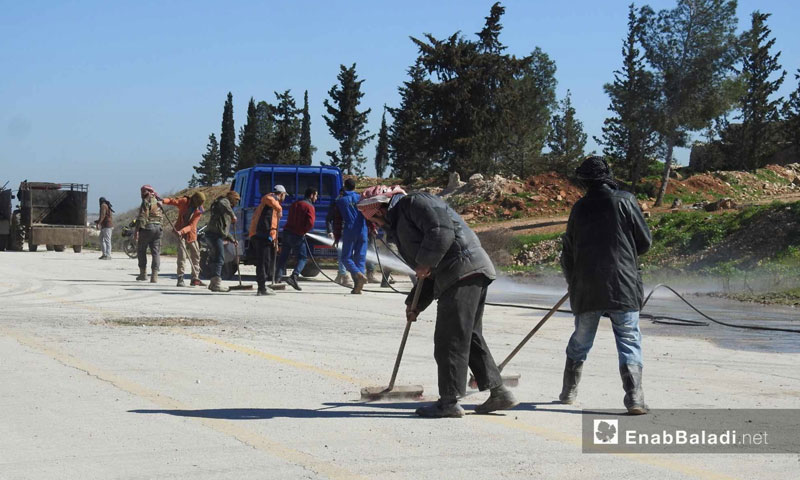



On March 17, bulldozers motioned towards the western part of the city of al-Bab, removing the berms and the dirt piled at the first crossing to connect the Turkey-run areas in rural Aleppo with the Syrian regime-held areas, under a the decision of the “National Army,” which is supposed to completely administer its affairs in the upcoming days.
The crossing, the first to connect the two areas and called “Abu al-Zendain,” is expected to revive the movement of trade in rural Aleppo, particularly vegetable, which to sell the merchants in the past a few years resorted to the crossings between Idlib governorate and the regime’s areas of control, in addition to the two crossings of al-Iss and al-Mansurah, southern and western rural Aleppo.
In an interview with Enab Baladi, Lieutenant Commander Yousef Hamoud, the spokesperson of the “National Army”, said that the crossing is opened based on the decision made by the command of the national Army and its brigades.
He views that opening the crossing would put an end to the double revenues of the “Democratic Union Party” (PYD), “for the vehicles that leave the area towards the areas controlled by the Syrian regime, take the roads leading to Manbij, due to which the vehicles are subjected to double taxes.”
The crossing’s returns would be allocated to the “National Army”, all its brigades included, giving the area a source of support, according to the Army’s spokesperson.
The crossing, so far, has witnessed the passage of no cars or commercial trucks, and the taxes to be paid to the factions of the “National Army” have not also been defined, those demanded from the merchants nor the ones to be given in return for the commodities to pass from/to northern rural Aleppo’s areas. The Syrian regime, for its part, did not comment on the issue of opening the crossing on its side, and the announcement and the movement were limited to the opposition faction alone.
Talks about the opening of the crossing started in December 2018, and it is located to the west of the city of al-Bab, near the village of al-Shemawiyah, held by the Syrian regime.
The crossing, according to Hamoud, is to facilitate the civilians’ movement between the liberated areas and those controlled by the Syrian regime, and it is to be run by a civil and a military administration.
The citizens expect the alleviation of some of their burdens with the opening of the crossing, especially since it is the only direct route from the area to the city of Aleppo, without the need to pass through the areas held by the Kurdish “People’s Protection Units”.
Abdulkhaliq Asfour, a merchant from the city of al-Bab said: “Opening the crossing is a good idea, as it will largely affect the area in terms of trade.”
He told Enab Baladi the following: “Opening the crossing will shorten the distance and time that the vegetable and commodities trucks have to spend coming from the Syrian regime’s control areas in Latakia and Tartous. […] Its opening will decrease the costs of shipping the goods, particularly because the wages that drivers ask for will be less than those they received in the past.”
According to the merchant, the opening of the crossing is advantageous for both citizens and merchants alike, explaining that the transportation costs are defined based on the total load of the vehicle, for example, earlier on, the fees of transporting eight tons of tomato from Tartous to rural Aleppo was 500 thousand Syrian pounds, because the vehicle had a long distance to pass.
Today, following the opening of the crossing, the merchant added, the cost of transporting the same amount would not exceed the mark of 300 thousand Syrian pounds. Accordingly, this will affect the price of the single kilogram of tomatoes and the rest of the vegetables.
In a former interview, Abdulrahman al-Naser, a farmer in northern rural Aleppo, spoke of the several difficulties facing the farmers in the area while seeking to sell their production, telling Enab Baladi that shipping the crops to the areas of the Syrian regime is extremely costly, the reason why the farmers are demanding the opening of transit routes with Turkey, which are to lead to Iraq from there.
In the opposition-held areas in Northern Syria, which are not run by Turkey, there are four crossings with the areas of the Syrian regime: Murak, al-Iss, Qalaat al-Madiq, and al-Mansurah.
Nonetheless, all these crossings are closed except for the al-Iss in southern rural Aleppo, which is still open and witnessing the shipment of commodities and vegetables from northern and eastern rural Aleppo and Idlib.
The farmers in northern rural Aleppo, however, do not prefer to ship their production to the areas controlled by the Syrian regime because the al-Iss crossing is located far away, the high cost of shipping the commodities and the abundance of security checkpoints, factors that hinder their making revenues.
Enab Baladi’s correspondent for rural Aleppo explained that a large portion of the agricultural products in northern rural Aleppo, including potato, onions and tomatoes, are shipped to the areas of the Syrian regime through the al-Iss crossing, and another specific portion is exported to Turkey.
if you think the article contain wrong information or you have additional details Send Correction